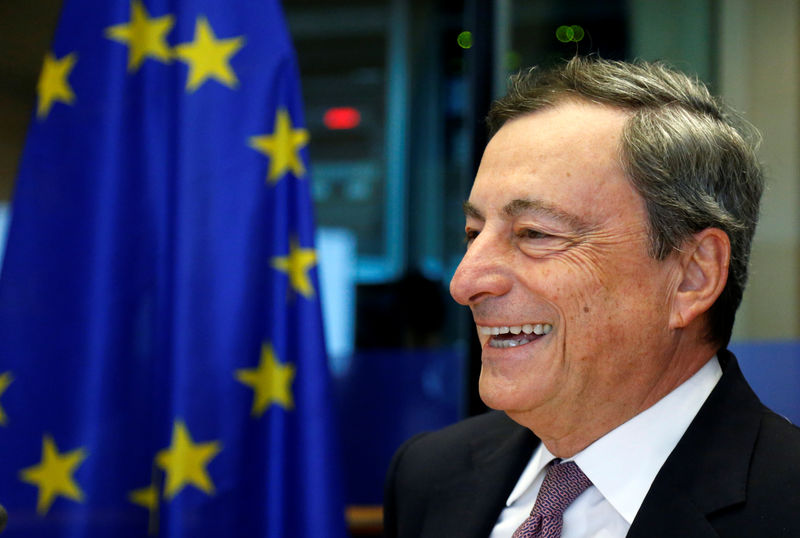BRUSSELS (Reuters) - The European Central Bank is growing increasingly confident that inflation will rise back to its target, but patience is still needed, not least to make sure the economic recovery lasts, ECB President Mario Draghi said on Monday.
Draghi singled out currency volatility as a source of uncertainty that required monitoring and argued that "ample" ECB accommodation was still needed, because a premature and hasty move could unravel its work.
"Overall, we are becoming more confident that inflation will eventually head to levels in line with our inflation aim, but we also know that a very substantial degree of monetary accommodation is still needed for the upward inflation path to materialize," Draghi said.
"We also have to be sensitive to the danger of not halting a recovery through hasty monetary-policy decision making," Draghi told the European Parliament's committee on economic affairs in Brussels. "We can't afford hasty moves."
With the euro zone economy now growing for the 17th straight quarter, the ECB is expected to wind down its stimulus efforts, starting next year, even if inflation looks to remain below the bank's near 2 percent target for years to come.
Indeed, policymakers speaking to Reuters said that the debate is now about the details of the policy shift, such as whether to keep its quantitative easing program open-ended or whether to signal an intent to phase out bond purchases.
But any change is likely to be incremental. Many policymakers are arguing for a gradualist approach to stop the euro from gaining too much.
"We still see some uncertainties with respect to the medium-term inflation outlook," Draghi said. "Most notably, the recent volatility in the exchange rate represents a source of uncertainty which requires monitoring.
"We therefore need to be patient and persistent."
Draghi also noted the effectiveness of the ECB's corporate bond purchases, arguing that they have lowered borrowing costs across the board, helping small and medium-sized businesses gain access to cheaper funding.
His support for corporate bond purchases may bolster calls to keep them going even if government bond buying is scaled back next year.
Launched two and a half years ago, the ECB's 2.3 trillion- euro bond-purchase scheme has depressed borrowing costs and helped revive spending and growth with the bloc creating over 7 million jobs since the worst days of Europe's debt crisis.
But inflation has been unexpectedly slow to respond, leaving the ECB with a dilemma. Keeping price growth just below 2 percent is its sole mandate; inflation was last at 1.5 percent.

But much of its firepower has been exhausted, and the inflation shortfall is at least partly outside its control. That has led policymakers to call for giving inflation more time, accepting that lifting prices will take several years longer than initially hoped.